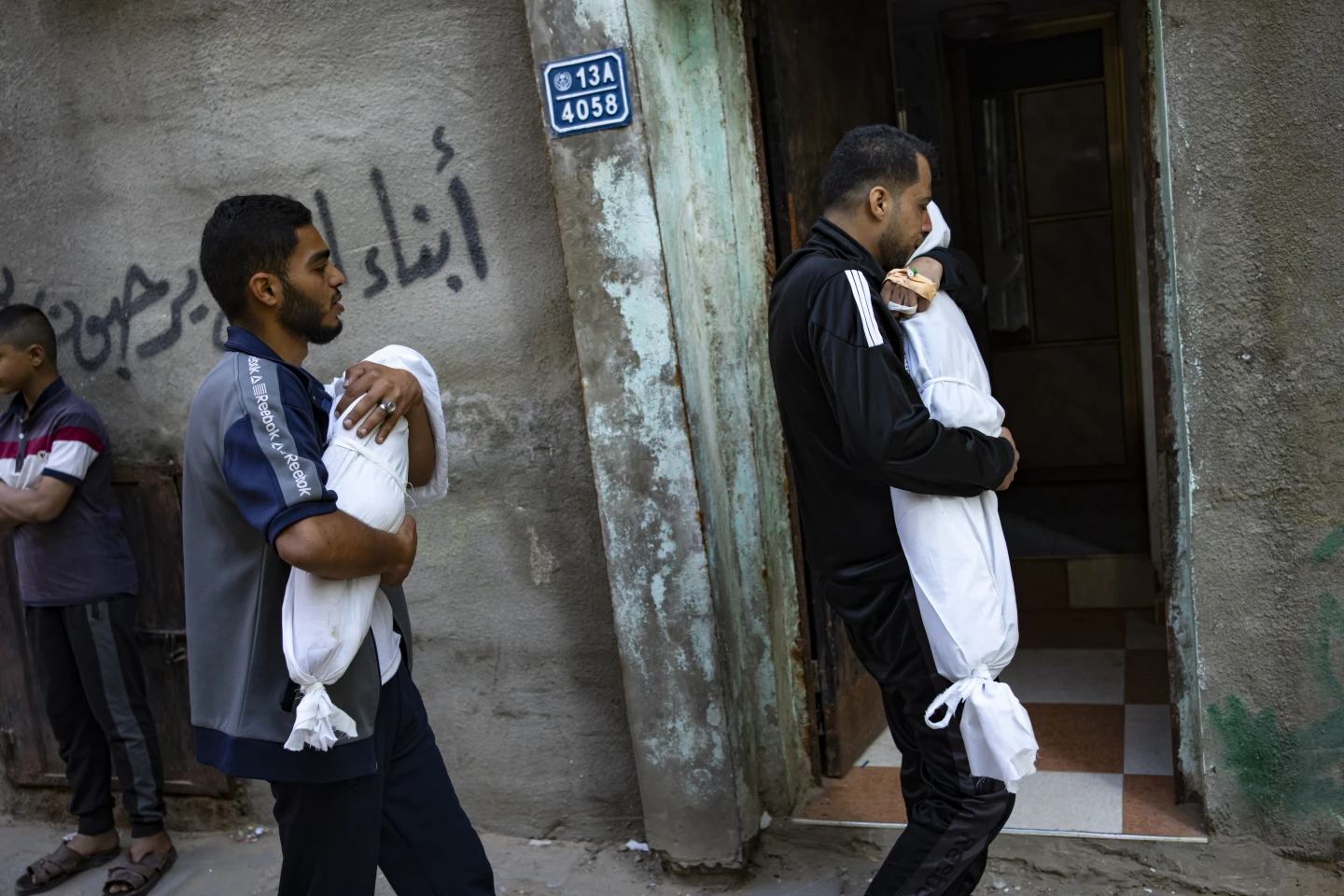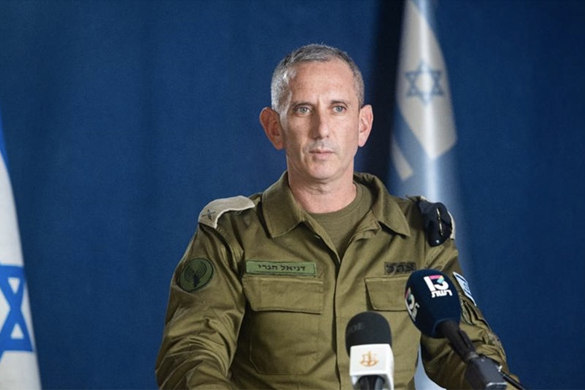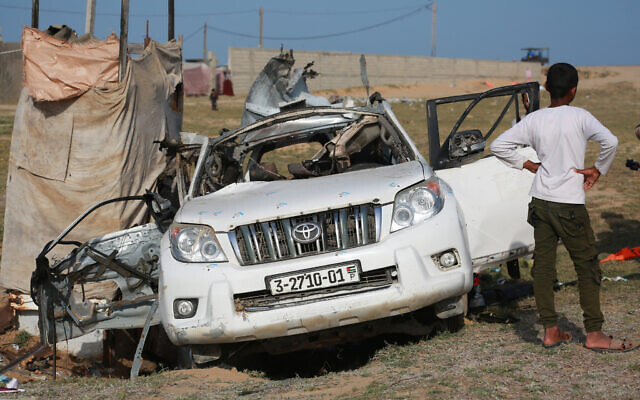 |
|
I hope you are doing well.
I’m writing to share important updates from the region, as well as J Street’s statements from this past week. As a reminder, you can always find our most recent statements on J Street crisis response page.
All the best,
Hannah
—
Hannah Morris
She/Her
Director of Government Affairs, J Street
Cell: 832-606-1817
J Street’s Congressional Resource Page
|
This week on j street
|
|
|
| STATEMENT |
|
J STREET HORRIFIED BY WORLD CENTRAL KITCHEN DEATHS, CALLS FOR URGENT CHANGES
|
| Read more → |
|
|
|
|
|
What we’re reading
|
Blinken says Israeli offers to increase flow of aid to Gaza are welcome but may not be sufficient
|
 |
| U.S. Secretary of State Antony Blinken said Friday that the measures the Israeli government has announced to expand the flow of aid into Gaza are welcome but may not be enough to meet the Biden administration’s demands for dramatic improvements in humanitarian conditions in the territory. Blinken said that opening more border crossings, if fully implemented, has the potential to surge assistance to Palestinians caught in the fighting between Israel and Hamas. However, the U.S. also wants to see tangible steps to bolster the protection of civilians and aid workers, he said… “We welcome that steps that have been announced by Israel,” Blinken said. “These are positive developments but the real test is results and that’s what we’re looking to see in the coming days and the coming weeks.” At the same time, he said the U.S. wanted to see a “better system for de-confliction and coordination” so that aid can be safely delivered and distributed inside Gaza. “All of these things are critical and that really needs to be measured by results,” Blinken told reporters, |
| read more |
String of Israeli Errors Led to Fatal Attack on Aid Convoy, Military Says
|
 |
| A series of Israeli failures, including a breakdown in communication and violations of the rules of engagement, led to the deadly airstrikes that killed seven humanitarian aid workers in Gaza this week, senior Israeli military officials said on Friday. The military officials said that the officers who ordered the strikes on the aid convoy had violated the army’s protocols, in part by opening fire on the basis of insufficient and erroneous evidence that a passenger in one of the cars was armed. The attack prompted a wave of international outrage and renewed questions about whether Israeli forces on the ground in Gaza properly vet targets before unleashing deadly force… On Friday, the Israeli military announced that two officers — a reserve colonel and a major — would be dismissed from their positions… The military said the “grave mistake” had stemmed from “a serious failure due to a mistaken identification, errors in decision-making, and an attack contrary to the Standard Operating Procedures.” “It’s a tragedy,” Rear Adm. Daniel Hagari, the Israeli military’s chief spokesman, told reporters in a briefing on Thursday night. “It’s a serious event that we’re responsible for, and it shouldn’t have happened.” |
| read more |
Israel’s Top Court: Not Enough Humanitarian Aid Is Getting Into the Gaza Strip
|
 |
| The High Court of Justice held a hearing on Thursday to review a petition filed by human rights organizations which had demanded an expansion of the scope of humanitarian aid delivered to the Gaza Strip. They claimed that Gaza’s inhabitants were suffering from malnourishment and that Israel should supply the needs required for their survival… Justice Amit emphasized the importance of the petition, wondering about the gaps between figures presented by the state and those shown by the plaintiffs. “This petition is important for the state, but it says that it is not posing any limitations, not on food, water, medical equipment or medicines. The state says that there are limits only on fuel, providing data showing that 44 trucks carrying such supplies cross into Gaza every hour. If so, where is the bottleneck?” he wondered… Justice Vogelman criticized the state’s position, saying that additional aid routes were not a sufficient alternate route of supplies. He noted that one solution could be an increase in the number of trucks going through the Kerem Shalom crossing. “The overall number is insufficient,” said Vogelman. Justice Amit wondered about the limit set on the number of trucks entering the northern Gaza Strip. “I don’t understand why there aren’t more trucks directly entering that area,” he said. |
| read more |
U.S. approved more bombs to Israel on day of World Central Kitchen strikes
|
 |
| The Biden administration approved the transfer of thousands more bombs to Israel on the same day Israeli airstrikes in Gaza killed seven aid workers for the charity group World Central Kitchen, three U.S. officials told The Washington Post this week after the incident elicited global condemnation… The State Department approved the transfer of more than 1,000 MK82 500-pound bombs, more than 1,000 small-diameter bombs, and fuses for MK80 bombs, all from authorizations granted by Congress several years before the latest hostilities between Israel and Hamas began, said the U.S. officials, who like others spoke on the condition of anonymity to discuss sensitive arms deals. A State Department spokesperson confirmed the approval and said it occurred sometime “prior” to when the Israeli aircraft struck the aid convoy. The U.S. government has the authority to suspend an arms package anytime before delivery, which the spokesperson said probably would not occur until 2025 or later. It has not done so in this case. |
| read more |
UAE pauses Gaza aid route support after Israeli strike kills humanitarian workers
|
 |
| The United Arab Emirates is pausing its involvement in the maritime aid corridor to Gaza until Israel assures aid workers in the enclave will be protected, sources close to the UAE government told Axios. The announcement comes after seven humanitarian workers with the nonprofit World Central Kitchen (WCK) were killed by an Israeli airstrike in Gaza on Monday. The UAE is the main funder of the organization’s aid route that has been leading efforts to get food by sea to Gaza, which the United Nations has warned is on the verge of famine… The organization said it was pausing its operations in the area after the attack… The U.S., the UN and many aid organizations have been urging Israel’s government for months to do more to improve its deconfliction mechanisms to avoid targeting aid convoys. The Biden administration raised this issue on a very high level with the Israeli government several times, but there was little change on the ground, U.S. officials say. |
| read more |
Senior Israeli official warns of growing ‘shoot first, ask later’ culture in IDF
|
 |
| A culture has percolated in some corners of the IDF in which soldiers are “shooting first [in Gaza] and asking questions later,” a senior Israeli official said Wednesday, as anger over the killing of seven aid workers in an airstrike earlier this week simmered in capitals around the world, further straining Jerusalem’s diplomatic ties… The senior Israeli official, speaking on condition of anonymity, pointed to both the killing of the WCK staffers, who had been transporting aid sent to Gaza via ship, and a December incident in which troops opened fire on and killed three Israeli hostages who managed to escape captivity and were waving a white flag. Both that incident and the one on Monday represented violations of the IDF’s rules of engagement, the senior official told The Times of Israel. “Soldiers are operating under immense pressure in very difficult conditions in which Hamas embeds itself within the civilian population, but the rules of engagement are designed to help deal with such conditions, and they’re too often being ignored,” said the senior Israeli official. |
| read more |
Israeli Army Withdraws From Major Gaza Hospital, Leaving Behind a Wasteland
|
 |
| The symbolism of this hellscape differs according to the beholder, amid a deep divergence about how the conflict should be reported and explained. To the Israelis who brought me to Al-Shifa on Sunday, the carnage is the result of Hamas’s decision to turn a civilian institution into a military stronghold, leaving Israel with no option but to enter it by force: Exhibit A in what they see as a war of necessity that they did not start. “We had no alternative,” said Rear Adm. Daniel Hagari, Israel’s chief military spokesman, who led the visit. “We wanted to leave those places functional, but what happened was Hamas and Islamic Jihad were barricading and firing at our forces from the beginning.” To the Palestinians who returned to Al-Shifa on Monday, searching for dead bodies after the Israelis withdrew, it was the embodiment of Israel’s perceived disregard for civilian life and infrastructure in its pursuit of Hamas… Analysts have said that Israel’s return to Al-Shifa, more than four months after it was first captured, represents a strategic failure: It is the result of Israel’s unwillingness to set in motion any transition of power to forces independent of Hamas, creating a vacuum that has allowed Hamas to regroup. |
| read more |
Netanyahu Is Sabotaging Chances for a Hostage Deal, and Defense Chiefs Are Angry
|
 |
| Most of the delays by the Israelis stem from Netanyahu’s work methods and political considerations… Now, as the hostage families’ nerve-racking wait for Hamas’ reply continues, defense officials are increasingly unhappy with Netanyahu. According to a former senior intelligence source on Alon’s team [Maj. Gen. (res.) Nitzan Alon, one of Israel’s hostage negotiators], “There are increasing signs that he’s doing almost everything possible to postpone, delay and ruin the chance of a deal to release the hostages in exchange for terrorists”… The defense chiefs are united vis-à-vis Netanyahu. They believe that the release of the hostages is a supreme moral injunction and a matter of national security, and also vital to achieve the war aims and improve Israel’s strategic position in the region…. Whatever the case, defense officials believe that if this time too the deal on the table isn’t implemented, and it turns out that Netanyahu is to blame rather than an inflexible Hamas, the defense establishment’s anger at the prime minister will intensify. |
| read more |
Buffer Zone and Control Corridor: What the Israeli Army’s Entrenchment in Gaza Looks Like
|
 |
| Without providing many details, Israel is currently pursuing a massive project in the Gaza Strip – the establishment of a buffer zone adjacent to the border fence with Israel. The planned zone will be about one kilometer wide, and upon completion will encompass some 16 percent of the Gaza Strip’s area. The project involves IDF engineering forces which are operating in the field, significantly expanding the area declared by the IDF as a Palestinian no-go zone before the war. The project is already provoking stark criticism from the international community… This infrastructure project joins another which is already taking shape – the creation of a control corridor, cutting the Gaza Strip into two parts and allowing the IDF to control traffic on strategic roads, which are at the core of negotiations with Hamas. These two projects – the buffer zone and the control corridor – together imply that the IDF is preparing for a long-term presence in the Strip. |
| read more |
José Andrés: Let People Eat
|
 |
| From Day 1, we have fed Israelis as well as Palestinians. Across Israel, we have served more than 1.75 million hot meals. We have fed families displaced by Hezbollah rockets in the north. We have fed grieving families from the south. We delivered meals to the hospitals where hostages were reunited with their families. We have called consistently, repeatedly and passionately for the release of all the hostages. All the while, we have communicated extensively with Israeli military and civilian officials. At the same time, we have worked closely with community leaders in Gaza, as well as Arab nations in the region. There is no way to bring a ship full of food to Gaza without doing so. That’s how we served more than 43 million meals in Gaza, preparing hot food in 68 community kitchens where Palestinians are feeding Palestinians. We know Israelis. Israelis, in their heart of hearts, know that food is not a weapon of war. Israel is better than the way this war is being waged. It is better than blocking food and medicine to civilians. It is better than killing aid workers who had coordinated their movements with the Israel Defense Forces. The Israeli government needs to open more land routes for food and medicine today. It needs to stop killing civilians and aid workers today. It needs to start the long journey to peace today. In the worst conditions, after the worst terrorist attack in its history, it’s time for the best of Israel to show up. You cannot save the hostages by bombing every building in Gaza. You cannot win this war by starving an entire population. |
| read more |
|